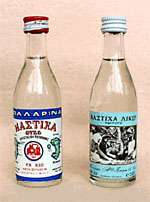Mastika

Mastika is a liqueur seasoned with mastic, a resin gathered from the mastic tree, a small evergreen tree native to the Mediterranean region. A variant is Mastiha, which is produced on the Greek island of Chios and has a protected designation of origin in the European Union.[1]
The name of the resin, whence the name of the drink, is derived from the Greek "to chew, to gnash the teeth".
Local varieties
Greece
Main article: Mastiha
In Greece, two different drinks are known under the umbrella term mastiha. Mastiha Chiou (or Chios Mastiha), is a brandy-based liqueur native to the island of Chios, where mastic has traditionally been cultivated[2]
The other drink is a strong spirit similar to ouzo or tsikoudia. It is served cold or at room temperature but usually with ice. Both turn white (louche) when poured over ice or mixed with water, forming small crystals when frozen. They are served with various mezedes — appetizers such as octopus, salad, sardines, calamari, fried zucchini, and clams.
Mastiha often accompanies desserts made with almonds and is served at wedding feasts as a digestif. It has a sweet smell and flavor similar to liquorice.
Bulgaria
In Bulgaria mastika is a strong anise-flavoured drink, consumed chilled. Mastika is often combined with menta, a mint liqueur, to make a traditional cocktail called "cloud".
According to Bulgarian law, "Mastika is an alcoholic drink with minimum 47% vol. of alcohol, made of natural ethanol flavoured with anethole, extracted by rectification of essential oils from star anise (Illicium verum), anise (Pimpinella anissum), fennel (Foeniculum vulgare) or other plant, containing the same aroma component with concentration at least of 2.5 grams per litre, sugar at least 40 grams per litre, with or without addition of mastic and/or aroma destilate and has specific organoleptic characteristics."[3]
Macedonia
In Macedonia, mastika is most commonly consumed as an aperitif, usually poured over ice and enjoyed with meze. Containing 43–45% alcohol, it has a hot taste not unlike that of brandy and is usually made from grapes, raisins, plums or figs. In Macedonia, mastika has traditionally been made in the Strumica area; the best known Macedonian brand, Strumička mastika ("Mastika of Strumica"), made by the company Grozd since 1953, contains 43% alcohol and is produced exclusively at export quality.
Romania
In Romania, mastícă[4] is used as a wedding toast and is thought of as a good accompaniment to traditional chicken dishes.
Other
Turkish raki can sometimes contain mastic.
Production
The production of mastika usually starts with alcoholic base of made from fermented fruit (usually grapes) and double distilled and filtered through the roots of the mastic tree. The alcohol can also be flavoured with the resin of the tree to give the alcoholic drink its distinctive pine-like taste.
References
- ↑ http://ec.europa.eu/agriculture/quality/door/list.html;comboName=Masticha%20Chiou
- ↑ "The Magic Tree - Marvelous Masticha", Epikouria Magazine, Fall/Winter 2005
- ↑ Наредба за определенията на видовете спиртни напитки, видовете суровини и технологични операции, правилата за производство на спиртните напитки, разрешените добавки и условията за използването им, ДВ бр. 68 от 2006 г.
- ↑ "Mastícă". dexonline.ro (in Romanian). External link in
|work=(help)